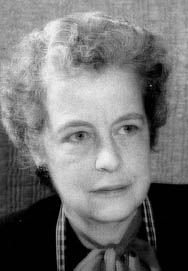Margaret Ingels
 From Wikipedia - Reading time: 7 min
From Wikipedia - Reading time: 7 min
Margaret Ingels | |
|---|---|
 | |
| Born | October 25, 1892 |
| Died | December 13, 1971 (aged 79) |
| Education | B.S. in Mechanical Engineering, 1916 |
| Alma mater | University of Kentucky |
| Occupation | Mechanical Engineering |
| Employer | Carrier-Lyle Corporation |
| Known for | Pioneer in the development of air conditioning. First female engineering graduate from the University of Kentucky; second woman engineering graduate in the United States; first woman to receive the professional degree of Mechanical Engineer. |
Margaret Ingels (October 25, 1892 – December 13, 1971)[1] was an American engineer. She is known as the first female engineering graduate from the University of Kentucky, receiving her Bachelor of Science degree in mechanical engineering in 1916.[2] She was also the second woman engineering graduate in the United States and the first woman to receive a professional degree of Mechanical Engineer.
Her work on air conditioning included "developing the “effective temperature” scale to incorporate humidity and air movement in the equation for human comfort."[3]
Early life
[edit]Margaret Ingels was born on 25 October 1892. She attended school in her home town of Paris, Kentucky and was fascinated by scientific and engineering subjects, her interest having been sparked at a young age when she noticed moisture collecting on cold glass and learned about condensation.[4]
She continued her education at the University of Kentucky, receiving her Bachelor of Science degree in mechanical engineering in 1916. She was the first woman to graduate in engineering from the university.
Career
[edit]Following graduation, she worked for the Chicago Telephone Company in the traffic engineering department.
She then left Chicago in 1917 for Pittsburgh and the Carrier Engineering Corporation, where her interest in air conditioning began.
She received her Mechanical Engineering professional degree in 1920 and the next year she joined the American Society of Heating and Ventilating Engineers research lab, where she studied air conditioning for six years. "She perfected a new portable machine that determines the amount of germ-laden dust in schoolrooms and public places" while conducting field tests for the New York Commission on School Ventilation.[5]
In 1931, she returned to the Carrier-Lyle Corporation where she stayed until her retirement. At Carrier, she "helped perfect the sling psychrometer, which is used to read the relative humidity of the air."[5]
She was a spokesperson for the profession, speaking to more than 12,000 people during more than 200 speeches from 1932 to 1952. In 1937, she was included in an article by M. Elsa Gardner on Women Engineers in the journal of the Women's Engineering Society, alongside Kate Gleeson, Elsie MacGill, Frances Hurd Clark, Mary Olga Soroka, Marie Lurhing, Marie Reith, Olive Dennis, Isabel Ebel, Hilda Lyon and Amy Johnson.[6]
In 1940 she was selected as one of 100 women in the United States who had successful careers in fields not open to women in 1840.[7]
Works
[edit]- Ingels, Margaret (1972). Willis Haviland Carrier, father of air conditioning. Technology and society. New York: Arno Press. ISBN 0405047088.
- Ingels, Margaret (1925). Comparative tests of instruments for determining atmospheric dusts ... Washington, D.C.: Government Printing Office. LCCN 25026420.
She wrote more than 45 technical papers, as well as an article titled Petticoats and Slide Rules, which documented "the pioneer American women of the engineering field."[3]
Legacy and Commemoration
[edit]A dormitory named Ingels Hall was opened in August 2005 at the University of Kentucky intended for women engineering students.[8]
The Collegiate Section of the Society of Women Engineers at the University of Kentucky established a Fellowship Fund in her memory for students enrolled in a Master of Science or Ph.D. program in an engineering discipline.[9]
References
[edit]- ^ "UK Alumni Association - Margaret Ingels". Ukalumni.net. 1971-12-13. Retrieved 2012-10-17.
- ^ Colemen Jr, Winston (1965). College of Engineering University of Kentucky (PDF).
- ^ a b Layne, Margaret E. (2009-06-05). Petticoat Engineer. ASCE Publications. ISBN 9780784409800. Retrieved 2017-10-02.
- ^ Women in engineering. Pioneers and trailblazers. Layne, Margaret. Reston, Va.: ASCE Press. 2009. ISBN 978-0-7844-0980-0. OCLC 300030570.
{{cite book}}: CS1 maint: others (link) - ^ a b "Biography, Margaret Ingels Collection (University of Kentucky), circa 1845 - 1967". Kentuckiana Digital Library. Retrieved 2013-10-16.
- ^ "The Woman Engineer Vol 4". twej.theiet.org. Retrieved 2023-02-12.
- ^ "Margaret Ingels". University of Kentucky College of Engineering, Alumni & Friends. Archived from the original on 2013-01-06. Retrieved 2013-10-16.
- ^ "Margaret Ingels (posthumous), BSME 1916, MSME 1920 | University of Kentucky College of Engineering". www.engr.uky.edu. Retrieved 2019-07-23.
- ^ "Margaret Ingels Society of Women Engineers Graduate Fellowship - Research Directions". Engr.uky.edu. Archived from the original on 2015-09-24. Retrieved 2012-10-17.
External links
[edit]- Margaret Ingels Collection (University of Kentucky), circa 1845 - 1967
- Photo of Margaret Ingels at the 1952 American Society of Civil Engineers Centennial of Engineering
- Margaret Ingels Residence Hall, University of Kentucky
- Margaret Ingels Society of Women Engineers Graduate Fellowship (University of Kentucky)
Further reading
[edit]- Layne, [edited by] Margaret E. (2009). Women in engineering. Reston, Va.: ASCE Press. ISBN 9780784472354.
{{cite book}}:|first1=has generic name (help)
 KSF
KSF